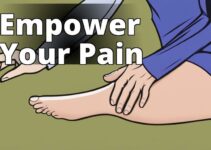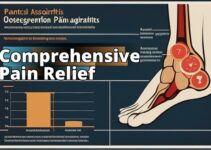Chronic pain is a persistent and debilitating condition that affects millions of individuals worldwide. It is crucial to understand the impact of chronic pain on daily life and the significance of effective pain management.
Learn About Pain Management for Chronic Pain
- Understand the causes and impact of chronic pain
- Explore diverse treatment options and lifestyle modifications
- Gain insights into holistic and emerging approaches for chronic pain relief
Definition of Chronic Pain
Chronic pain, a critical aspect of pain management for chronic pain, is persistent discomfort that extends beyond the expected period of healing. It can result from various factors, including injury, illness, or unknown causes. The keyword “pain management for chronic pain” encompasses a wide range of strategies and treatments to alleviate this prolonged suffering.
Impact on Daily Life
Chronic pain significantly impedes an individual's ability to perform daily activities, affecting mobility, productivity, and overall quality of life. It leads to emotional distress, social isolation, and decreased participation in work or recreational pursuits.
Importance of Effective Pain Management
Effective pain management for chronic pain is imperative to help individuals regain function, improve mental well-being, and enhance their overall quality of life. This article will explore the various facets of chronic pain, from its diagnosis and treatment to lifestyle modifications, psychological support, and holistic approaches to management.
Understanding Chronic Pain
Understanding the nature of chronic pain is essential in developing comprehensive management strategies.
Types of Chronic Pain
Chronic pain can manifest in various forms, including neuropathic pain, musculoskeletal pain, and visceral pain. Each type requires a tailored approach to effectively manage the underlying causes and symptoms.
Causes and Risk Factors
Chronic pain can stem from conditions such as arthritis, fibromyalgia, nerve damage, or as a result of past injuries. Risk factors may include age, genetics, lifestyle, and underlying health conditions.
Impact on Physical and Mental Well-being
Chronic pain can lead to physical limitations, reduced mobility, and sleep disturbances. Moreover, it can contribute to anxiety, depression, and diminished overall mental well-being.
Diagnosis and Treatment
Accurate diagnosis and a multi-faceted treatment approach are essential in chronic pain management.
Diagnostic Procedures for Identifying Chronic Pain
Diagnosis often involves a comprehensive medical history, physical examination, and diagnostic tests such as imaging studies or nerve conduction tests to determine the underlying cause of pain.
Conventional Treatment Options for Chronic Pain Management
Conventional treatments may include pharmacological interventions, physical therapy, and lifestyle modifications to alleviate pain and improve function.
Interventional Procedures and Surgeries for Chronic Pain
In some cases, interventional procedures like nerve blocks or minimally invasive surgeries may be recommended to manage chronic pain when conservative treatments are ineffective.
Medication Management for Chronic Pain
| Pros | Cons |
|---|---|
| Over-the-Counter Pain Relievers | Risk of dependence and misuse |
| Nonsteroidal Anti-Inflammatory Drugs (NSAIDs) | Side effects such as stomach irritation |
| Prescription Opioids | Potential for addiction and abuse |
| Adjuvant Medications | Possible side effects and interactions |
Medication plays a vital role in the management of chronic pain, offering relief and improved functionality for individuals.
Over-the-Counter Pain Relievers
Acetaminophen and nonsteroidal anti-inflammatory drugs (NSAIDs) are commonly used to alleviate mild to moderate chronic pain symptoms.
Prescription Opioids for Chronic Pain Management
Prescription opioids are prescribed cautiously and as a last resort due to the associated risks of dependence and misuse.
Nonsteroidal Anti-Inflammatory Drugs (NSAIDs) for Chronic Pain
NSAIDs, including ibuprofen and naproxen, are utilized to reduce inflammation and alleviate pain in chronic conditions such as arthritis.
Adjuvant Medications for Comprehensive Chronic Pain Management
Adjuvant medications, such as antidepressants and anticonvulsants, may be prescribed to manage neuropathic pain and improve overall pain control.
Integrative Approaches to Chronic Pain Management
Incorporating complementary and alternative therapies can enhance the overall management of chronic pain.
Acupuncture for Chronic Pain Relief
Acupuncture involves the insertion of fine needles at specific points on the body to alleviate pain and promote overall well-being.
Massage Therapy for Pain Management
Massage therapy can help reduce muscle tension, improve circulation, and provide relief from chronic pain, contributing to overall relaxation and well-being.
Yoga and Tai Chi for Chronic Pain
Yoga and tai chi promote flexibility, strength, and relaxation, potentially reducing chronic pain symptoms and improving overall physical and mental health.
Mindfulness Meditation and Relaxation Techniques for Chronic Pain Relief
Mindfulness meditation and relaxation techniques can help individuals manage stress, reduce pain perception, and improve coping mechanisms for chronic pain.
Lifestyle Modifications for Managing Chronic Pain
Adopting specific lifestyle modifications can significantly impact the management of chronic pain.
Importance of Exercise in Chronic Pain Management
Regular physical activity and tailored exercise routines can improve strength, flexibility, and overall physical function while managing chronic pain.
Nutrition and its Role in Chronic Pain Management
A balanced diet rich in anti-inflammatory foods and essential nutrients can play a crucial role in managing chronic pain and promoting overall well-being.
Sleep Management Strategies for Chronic Pain Relief
Implementing sleep hygiene practices and addressing sleep disturbances are essential in managing chronic pain and improving overall quality of life.
Stress Reduction Techniques in Chronic Pain Management
Stress reduction techniques such as deep breathing exercises, mindfulness, and relaxation can alleviate tension and promote pain relief for individuals with chronic pain.
Psychological Support for Chronic Pain Management
Managing the psychological aspects of chronic pain is integral to comprehensive care.
Role of Mental Health Professionals in Chronic Pain Care
Mental health professionals, including psychologists and psychiatrists, play a crucial role in addressing the emotional and psychological impact of chronic pain.
Counseling and Psychotherapy for Chronic Pain Management
Counseling and psychotherapy can help individuals develop coping strategies, manage anxiety and depression, and improve overall mental well-being in the context of chronic pain.
Cognitive-Behavioral Therapy for Chronic Pain Relief
Cognitive-behavioral therapy (CBT) is an evidence-based approach that helps individuals reframe negative thought patterns, manage pain perception, and improve overall functioning.
Pain Management Clinics and Chronic Pain
Specialized pain management clinics offer comprehensive care tailored to the unique needs of individuals with chronic pain.
Multidisciplinary Approach in Pain Management for Chronic Pain
Pain management clinics often employ a multidisciplinary team of healthcare professionals, including physicians, physical therapists, and psychologists, to address the multifaceted nature of chronic pain.
Services Offered at Pain Management Clinics for Chronic Pain Relief
These clinics offer a wide range of services, including medication management, interventional procedures, physical therapy, and psychological support, to alleviate chronic pain and improve overall well-being.
Patient-Centered Care in Chronic Pain Management
Patient-centered care emphasizes the importance of individualized treatment plans, shared decision-making, and ongoing support for individuals managing chronic pain.
Support Networks for Chronic Pain Management
Engaging with support networks is crucial in navigating the challenges of chronic pain and finding a sense of community and understanding.
Benefits of Support Groups in Chronic Pain Management
Support groups provide individuals with chronic pain an opportunity to share experiences, gain insights, and receive emotional support from peers facing similar challenges.
Online Communities for Chronic Pain Support
Online communities and forums offer a platform for individuals to connect, share resources, and seek advice from a global network of individuals managing chronic pain.
Peer Support and Empowerment in Chronic Pain Management
Peer support programs empower individuals to take an active role in managing their chronic pain, providing guidance, encouragement, and a sense of community.
Holistic Approaches to Chronic Pain Management
Integrating conventional and alternative methods can offer a holistic approach to chronic pain relief.
Integrating Conventional and Alternative Methods for Chronic Pain Relief
Combining pharmacological interventions, physical therapy, and complementary therapies can provide comprehensive and personalized approaches to managing chronic pain.
Holistic Pain Management Plans for Chronic Pain Relief
Holistic pain management plans address the physical, emotional, and psychological aspects of chronic pain, aiming to improve overall well-being and functioning.
Emerging Technologies in Chronic Pain Management
Advancements in technology offer innovative approaches to chronic pain management.
Neurostimulation Therapies for Chronic Pain Relief
Neurostimulation therapies, including spinal cord stimulation and peripheral nerve stimulation, offer targeted pain relief by modulating the body's pain signals.
Regenerative Medicine for Chronic Pain Management
Regenerative medicine, such as stem cell therapy and platelet-rich plasma injections, holds promise in promoting tissue repair and reducing chronic pain symptoms.
Virtual Reality Therapy for Chronic Pain Relief
Virtual reality therapy provides immersive experiences that distract individuals from pain, promote relaxation, and offer non-pharmacological pain relief for chronic conditions.
Self-Advocacy in Chronic Pain Management
Empowering individuals to advocate for their pain management needs is crucial in fostering effective communication and personalized care.
Effective Communication with Healthcare Providers in Chronic Pain Management
Open and transparent communication with healthcare providers is essential in articulating pain experiences, treatment preferences, and overall well-being.
Navigating Treatment Options for Chronic Pain Relief
Understanding the available treatment options, including their benefits and risks, enables individuals to make informed decisions about their chronic pain management.
Advocating for Pain Management Needs in Chronic Pain Care
Advocating for comprehensive and compassionate pain care promotes individual agency, personalized treatment plans, and improved overall quality of life.
Long-Term Strategies for Chronic Pain Management
Developing sustainable long-term strategies is essential in managing chronic pain effectively.
Challenges of Long-Term Pain Management for Chronic Pain
Long-term pain management presents challenges such as treatment adherence, medication tolerance, and the need for ongoing support and monitoring.
Risks of Medication Dependence in Chronic Pain Management
Addressing the risks of medication dependence and exploring alternative pain management strategies is essential in promoting long-term well-being for individuals with chronic pain.
Importance of Regular Follow-Ups in Chronic Pain Care
Regular follow-ups with healthcare providers enable ongoing assessment, treatment adjustments, and the implementation of new strategies to address evolving needs in chronic pain management.
Patient Stories in Chronic Pain Management
Real-life experiences provide valuable insights into the challenges, triumphs, and resilience of individuals living with chronic pain.
Real-Life Experiences of Individuals Living with Chronic Pain
Personal narratives offer a glimpse into the daily experiences, coping mechanisms, and successes of individuals navigating life with chronic pain.
Journeys, Challenges, and Successes in Chronic Pain Management
Sharing stories of resilience, adaptation, and the pursuit of a fulfilling life provides hope and inspiration for others managing chronic pain.
Real-Life Journey with Chronic Pain
Living with chronic pain can be a challenging and isolating experience. Sarah, a 37-year-old marketing manager, has been managing chronic lower back pain for the past 10 years. Initially, the pain was the result of a sports injury, but over time, it evolved into a persistent condition that impacted every aspect of her life.
Impact on Daily Life
The chronic pain affected Sarah's ability to sit for long periods at work, making her job increasingly difficult. Simple tasks like grocery shopping or playing with her children became daunting. The constant discomfort took a toll on her mental well-being, leading to anxiety and frustration.
Journey to Finding Solutions
After trying various conventional treatments with limited success, Sarah explored integrative approaches. She found that a combination of acupuncture, regular yoga sessions, and mindfulness meditation provided her with significant relief. Making lifestyle modifications such as incorporating regular exercise and improving her sleep hygiene also played a crucial role in her pain management journey.
Importance of Support Networks
Sarah found solace in joining a local chronic pain support group, where she connected with others facing similar challenges. Sharing experiences and coping strategies with individuals who understood her struggles was immensely beneficial.
Sarah's journey with chronic pain underscores the multi-faceted nature of pain management and the significance of personalized, holistic approaches in regaining control of one's life despite the presence of persistent pain.
Resources and References
Accessing reputable organizations, literature, and supportive resources is essential in gaining comprehensive information and support for chronic pain management.
Reputable Organizations and Websites for Chronic Pain Management
Organizations such as the American Chronic Pain Association and the International Association for the Study of Pain offer valuable resources and information for individuals managing chronic pain.
Literature for Further Information and Support in Chronic Pain Management
Books, articles, and research papers provide in-depth knowledge and insights into chronic pain management, treatment options, and coping strategies.
Supportive Resources for Chronic Pain Management
Online platforms, community centers, and advocacy groups offer a wealth of supportive resources, including educational materials, peer support, and practical guidance for individuals with chronic pain.
In conclusion, this comprehensive guide offers insights into the diverse approaches to managing chronic pain, addressing the physical, emotional, and psychological aspects of this challenging condition. By integrating evidence-based strategies, individualized care, and a holistic approach, individuals with chronic pain can strive toward improved well-being and a better quality of life.
Answers To Common Questions
Q. What is chronic pain?
A. Chronic pain is persistent pain lasting beyond the normal healing time.
Q. Who can benefit from pain management for chronic pain?
A. Anyone experiencing long-lasting pain can benefit from pain management.
Q. How does pain management help with chronic pain?
A. Pain management techniques can help reduce pain and improve quality of life.
Q. What if I've tried pain management techniques before without success?
A. It's important to work with a healthcare provider to explore different options.
Q. How can I find the right pain management approach for me?
A. Consult with a healthcare professional to create a personalized pain management plan.
Q. What are non-pharmacological options for chronic pain management?
A. Non-pharmacological options include physical therapy, acupuncture, and relaxation techniques.
Isabella Mason is a licensed physical therapist with over 10 years of experience specializing in chronic pain management. She holds a Doctorate in Physical Therapy from the University of Southern California and has conducted extensive research on the impact of exercise and holistic approaches in managing chronic pain. Her work has been published in reputable journals such as the Journal of Pain Management and the American Journal of Physical Medicine & Rehabilitation.
Additionally, Isabella Mason has completed advanced certification courses in acupuncture and mindfulness-based stress reduction, further enhancing her expertise in integrative pain management techniques. She has also served as a consultant for pain management clinics, developing comprehensive multidisciplinary treatment plans for patients with chronic pain.
Isabella Mason is dedicated to providing evidence-based and compassionate care to individuals living with chronic pain, and she continues to advocate for holistic and patient-centered approaches in pain management.




